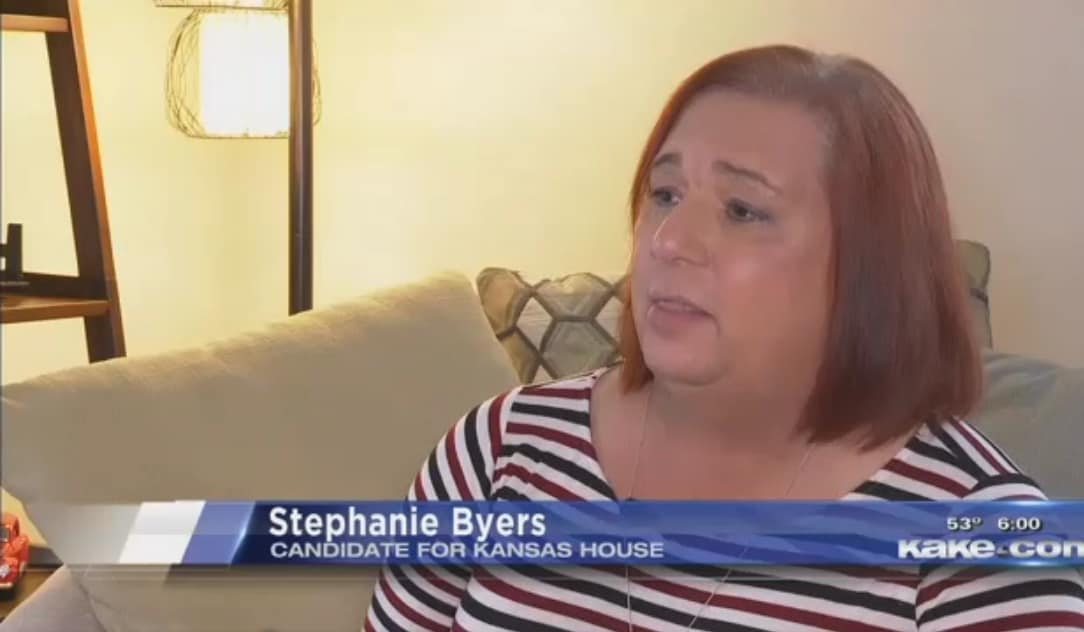Kansas could elect its first openly transgender lawmaker this fall

Three weeks after that conversation, she started campaigning as a Democrat for the open state representative seat in the district where she lives in Wichita. Now, Byers could become the first openly transgender person elected to the state legislature in Kansas.
Running unopposed, Byers won Tuesday’s Democratic primary and will move on to the November ballot in the longtime left-leaning district, where she’ll face off with Republican candidate Cyndi Howerton.
If Byers wins, she would join at least four openly transgender lawmakers serving in other states, including Danica Roem of Virginia, who became the first when she won her seat in November 2017; Gerri Cannon and Lisa Bunker, who both won seats in New Hampshire the following year; and Brianna Titone, who flipped a previously Republican district in Colorado to win her seat in the State House.
Byers, a retired music teacher, came out as a transgender woman about six years ago, while she was still teaching high school students to play music.
“For me, being transgender is just another aspect of who I am,” Byers told KAKE. “I am a member of the Chickasaw Nation. I ride a motorcycle. I’m a musician.”
She had been teaching at Wichita North High School, the largest public high school in the state, for more than two decades when she decided to transition. With the faculty and thousands of parents watching her, Byers said she was surprised by how much support and how little opposition she received.
Her principal, Sherman Padgett, announced Byers’s transition at a staff meeting before the 2014 school year.
“He announced who I was and who I would be from now on, and the response was overwhelming from my colleagues,” Byers told the Wichita Eagle. “People that I have never spoken to in this building came up and wrapped their arms around me to tell me how much they care for me and love me and were proud of me. It was very, very affirming.”
In 2018, she was named teacher of the year by the Gay, Lesbian & Straight Education Network (GLSEN) for her 28-year career as a band and orchestra director. She retired from teaching in 2019.
Over the past four years, Byers has also campaigned against “bathroom bills” that would ban transgender people from using the restroom that aligns with their gender identity rather than the sex they were assigned at birth.
She told Lesieur that she was inspired to oppose the bill by an experience she had as a child, when she was traveling to visit a Native American reservation on vacation with her father. Her family, who are from Oklahoma, belong to the Chickasaw Nation.
They stopped to use the restroom at a gas station, but the owner refused to let them after he found out they were Native American.
“I remember that,” she said. “I know what it feels like to have someone look at you, and because of who they see, say, ‘No, you can’t do this.’ ”
Although Byers’s activism around LGBTQ issues has influenced her political career, she has campaigned for the seat, which is open because longtime Rep. Jim Ward (D) decided to make a run for the state senate, primarily by advocating to increase funding for education and expanding Medicaid.
“The most precious resource we have are kids and as the state it’s our responsibility to help those kids be the best adults they could possibly be and give them every opportunity,” she told Lesieur. “Having teachers in office can help make that come through.”
Still, Byers has said she hopes to lead by example so that other people who identify as part of the LGBTQ community or as members of other marginalized groups will feel empowered to seek public office.
“If a state like Kansas can elect a trans woman to the House of Representatives, does that not give validation to trans people all over the place?” she said on the podcast. “In the process of doing this we’re opening doors for more and more people so that those people who feel marginalized in society can take steps to be part of society and not just be on the outside looking in.”
Byers’s campaign has raised a little over $3,400, according to the state’s Government Ethics Commission database; campaign finance records were unavailable for Howerton, who works for a tax preparation company.






